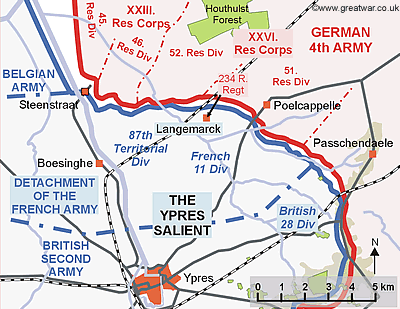 The French react to the German deserter's information
The French react to the German deserter's information
14 April 1915
General Ferry Takes the Warning Seriously
The morning after Private Jaeger's desertion, Wednesday 14th April, General Edmond Ferry, the commander of the French 11th Division, read Jaeger's statement about the planned gas attack. He was shocked by the suggestion that the Germans would deliberately use asphyxiating gas. Whilst General Ferry couldn't condone Private Jaeger's decision to desert and give away secret German information, he nevertheless took the warning seriously. Immediately he ordered that the French soldiers manning the forward trenches should be thinned out, so as to reduce the potential number of casualties. He ordered his artillery to fire on the German forward trenches to try to smash the cannisters which apparently contained the deadly gas.
“We got in touch at once with General Aimé, commanding the 21st Brigade which occupied the sector, and instructed him (i) to temporarily reduce the effectives, then accumulated in the forward trenches as ordered by higher authority, and so to avoid casualties from gas if the predicted attack should eventuate; (ii) to try to register and break with his artillery the reported cylinders...” (1)
12 Noon: General Ferry Sends a Message to the British and Canadians

Wanting to inform and warn the Allied division on his right about the possible planned German attack, General Ferry sent an officer with a message at noon to the neighbouring British 28th Division. He also sent a message to the 2nd Canadian Infantry Brigade; the 2nd and 3rd Canadian Infantry Brigades were due to move into his French 11th Division sector that night, forming the beginning of the relief of his French division by the 1st Canadian Division. General Ferry's message recommended that the Canadians should “exercise extra vigilance and to seek suitable means to prevent inhalation of gas”. (2)
General Ferry Sends a Message to French Senior Commanders
At the same time General Ferry passed a copy of the interrogation report of the German prisoner to his senior French commanders. These were General Balfourier, the commander of the French XX. Corps, and the Army commander General Henri Gabriel Putz, commander of the Détachement de l'Armée de Belgique. By chance there was a liaison officer from the French General Headquarters in the area too, and so he was also given the information and informed of the course of action that General Ferry had taken.
General Putz was sceptical about the information. He knew that the use of poison gas in war had been outlawed by the rules attached to the Hague Convention of 1907. He preferred to believe that the information from Private Jaeger was a deliberate ploy by the Germans to deceive the French. However, he was concerned enough to pass the information on to his superiors, namely King Albert of the Belgians at the Belgian Army headquarters in Houthem, and General Ferdinand Foch at the French army headquarters for the Groupe Provisoire du Nord in Cassel.
No Immediate Reaction from French HQ to General Ferry's Warning
With this speedy response General Ferry believed he had done everything necessary to forewarn the Allied senior commanders. The result of this valuable information would surely put the Allies in a position to negate the surprise intended for them by the Germans. It would also give them time to prepare the troops in the forward areas for an attack with gas and hopefully the result of this would be to minimise the risk of casualties. Sadly, this was not to be the case. It was to be two more days before General Ferry received a reply from the French Army Headquarters.
August Jaeger Sentenced to Jail in 1932
In 1932 General Ferry wrote an article in a magazine about this incident and named Private Jaeger as the deserter. August Jaeger was accused by the German Reich Supreme Court for desertion and betrayal. On 17th December 1932 he was sentenced to 10 years in prison.
Next>> King of Württemberg visits the Ypres battlefront
Acknowledgements
(1) Official History of the Canadian Forces in The Great War 1914-1919, Volume I, Chronology, Appendices and Maps, Appendix no. 180, p. 227-228
(2) Official History of the Canadian Forces in The Great War 1914-1919, Volume I, Chronology, Appendices and Maps, Appendix no. 180, p. 227-228
Gas! The Battle for Ypres 1915, pp. 12-13